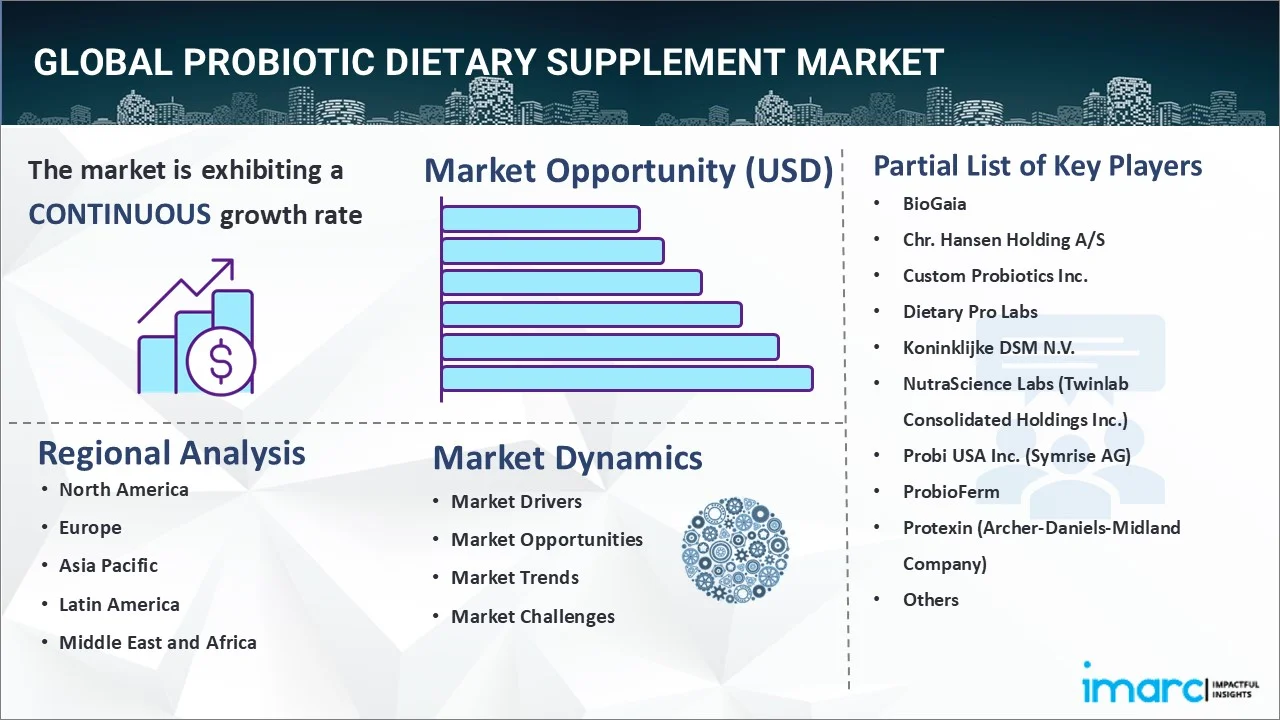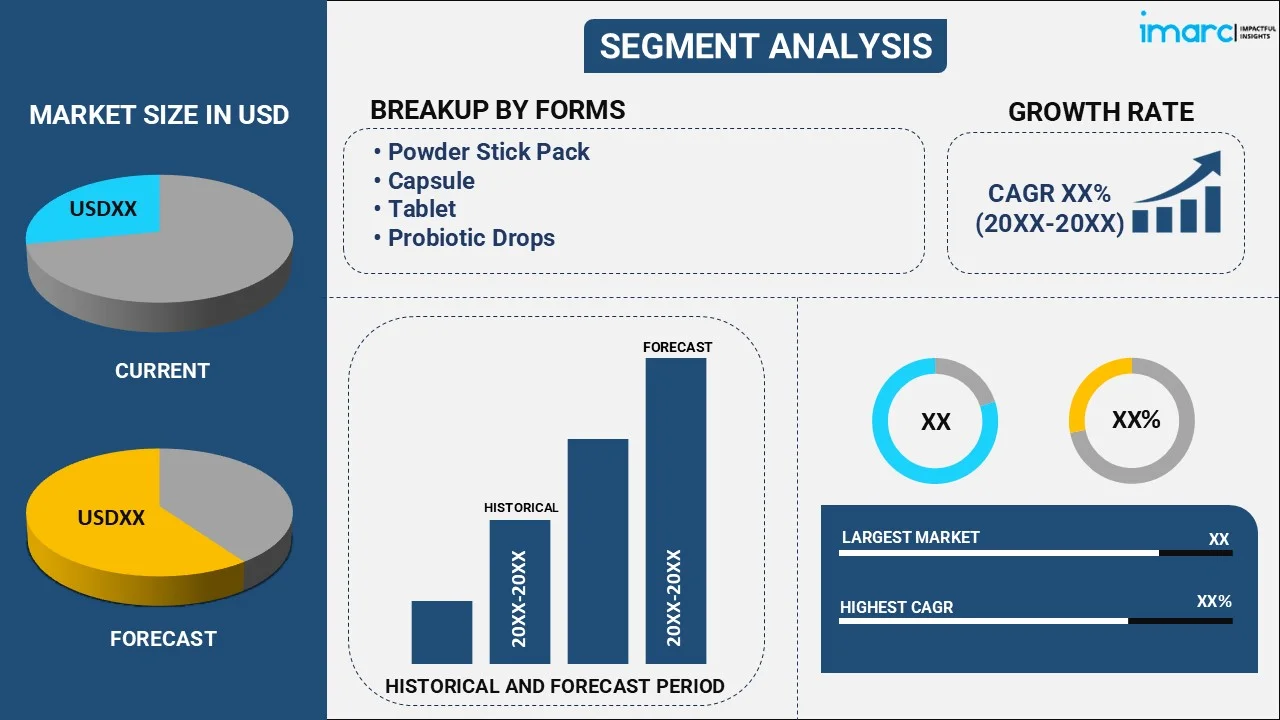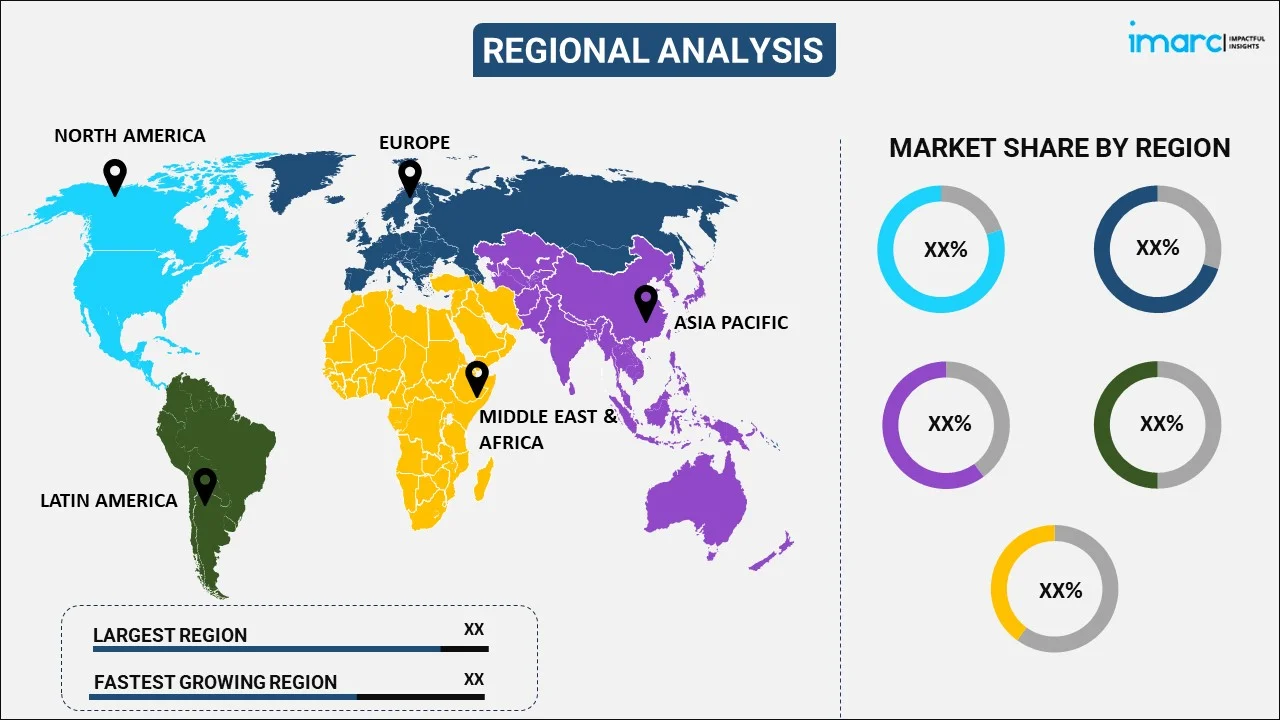
Probiotic Dietary Supplement Market Report by Form (Powder Stick Pack, Capsule, Tablet, Probiotic Drops), Distribution Channel (Supermarkets and Hypermarkets, Pharmacy and Health Stores, Online Stores, and Others), Application (Food Supplement, Nutritional Supplements, Specialty Nutrients, Infant Formula, and Others), and Region 2025-2033
Global Probiotic Dietary Supplement Market:
The global probiotic dietary supplement market size reached USD 7.8 Billion in 2024. Looking forward, IMARC Group expects the market to reach USD 12.9 Billion by 2033, exhibiting a growth rate (CAGR) of 5.8% during 2025-2033. The growing awareness among individuals towards maintaining a healthy gut is primarily driving the market.
|
Report Attribute
|
Key Statistics
|
|---|---|
|
Base Year
|
2024 |
|
Forecast Years
|
2025-2033
|
|
Historical Years
|
2019-2024
|
| Market Size in 2024 | USD 7.8 Billion |
| Market Forecast in 2033 | USD 12.9 Billion |
| Market Growth Rate 2025-2033 | 5.8% |
Probiotic Dietary Supplement Market Analysis:
- Major Market Drivers: The increasing focus on maintaining a balanced microbiome, along with the inflating need for natural and preventive healthcare measures, is one of the key factors propelling the overall market.
- Key Market Trends: Numerous innovations in the probiotic formulation and delivery methods are acting as significant growth-inducing factors. Besides this, the widespread emphasis on preventive healthcare measures is further contributing to the market.
- Competitive Landscape: Some of the prominent companies in the global market include BioGaia, Chr. Hansen Holding A/S, Custom Probiotics Inc., Dietary Pro Labs, Koninklijke DSM N.V., NutraScience Labs (Twinlab Consolidated Holdings Inc.), Probi USA Inc. (Symrise AG), ProbioFerm, Protexin (Archer-Daniels-Midland Company), Reckitt Benckiser Group plc, and Vitakem Nutraceuticals Inc., among many others.
- Geographical Trends: Europe exhibits a clear dominance in the market, owing to the shifting preferences for natural and proactive means of enhancing digestive health and immunity.
- Challenges and Opportunities: One of the primary challenges hindering the market is the growing requirement for more clinical research. However, several advancements in microbiome testing and analysis will continue to fuel the market over the forecasted period.

Probiotic Dietary Supplement Market Trends:
Increasing Integration with Nutraceuticals
One of the key factors stimulating the market is the widespread demand for probiotics combined with other nutraceuticals, such as minerals, vitamins, herbal extracts, etc., to create comprehensive health supplements. For instance, in April 2024, Vibrant Health released Trilogy, a daily 3-in-1 multivitamin plus omega-3 and probiotic supplement designed to simplify wellness routines without compromising on quality. The multivitamin provides vitamins B12, A, C, D3, E and essential minerals like magnesium, selenium, zinc, etc. Similarly, in April 2024, Sanofi Consumer Healthcare introduced a probiotic-based gut health supplement in the UK. This is expanding the probiotic dietary supplement market share.
Rising Product Innovations
Companies are developing new probiotic strains and delivery methods, which is a significant growth-inducing factor. Beyond traditional capsules, probiotics are now found in powders, gummies, beverages, and even skincare products. This diversification caters to different consumer preferences, thereby making it easier for people to incorporate probiotics into their lifestyles. For instance, in June 2024, Israeli agrifood tech startup Wonder Veggies launched the world’s first probiotic fresh produce by using technology that enables probiotic bacteria to penetrate plant tissue and serve as endophytes. This is positively influencing the probiotic dietary supplement market outlook.
Growing Demand for Personalized Nutrition
The emerging trend of offering tailored probiotic supplements based on individual health profiles is stimulating the market. Apart from this, adopting data from microbiome analysis, genetic tests, and lifestyle assessments, these customized solutions aim to address specific health needs more effectively. For example, in June 2024, Nestlé Health Science, one of the providers in nutritional science, introduced glp-1nutrition.com, a web platform designed to support individuals on their weight management journey, particularly those using GLP-1 medications. This is escalating the probiotic dietary supplement market demand.
Global Probiotic Dietary Supplement Industry Segmentation:
IMARC Group provides an analysis of the key trends in each segment of the market, along with the probiotic dietary supplement market forecast at the global, regional, and country levels for 2025-2033. Our report has categorized the market based on the form, distribution channel, and application.
Breakup by Form:

- Powder Stick Pack
- Capsule
- Tablet
- Probiotic Drops
Capsule currently exhibits a clear dominance in the market
The report has provided a detailed breakup and analysis of the market based on the form. This includes powder stick pack, capsule, tablet, and probiotic drops. According to the report, capsule represented the largest market segmentation.
Probiotic dietary supplements in the form of capsules are one of the most popular and convenient ways for consumers to incorporate beneficial bacteria into their daily health regimen. These capsules are designed to deliver live probiotic cultures directly to the gut, where they can help balance the intestinal microbiota, support digestion, and enhance immune function. For instance, a well-known product like Culturelle Health & Wellness Probiotic capsules contains Lactobacillus rhamnosus GG, a strain extensively studied for its health benefits. This, in turn, is elevating the probiotic dietary supplement market revenue.
Breakup by Distribution Channel:
- Supermarkets and Hypermarkets
- Pharmacy and Health Stores
- Online Stores
- Others
Currently, pharmacy and health stores hold the largest market share
The report has provided a detailed breakup and analysis of the market based on the distribution channel. This includes supermarkets and hypermarkets, pharmacy and health stores, online stores, and others. According to the report, pharmacy and health stores represented the largest market segmentation.
Probiotic dietary supplements are widely available through pharmacies and health stores, making them easily accessible for consumers seeking to enhance their gut health. These retail outlets often offer a broad range of probiotic products catering to various health needs and preferences. For example, pharmacies like CVS and health stores such as GNC carry well-known brands like Align Probiotic, which is designed to promote digestive balance and support healthy gut flora. This is elevating the probiotic dietary supplement market's recent price.
Breakup by Application:
- Food Supplement
- Nutritional Supplements
- Specialty Nutrients
- Infant Formula
- Others
Nutritional supplements account for the majority of the total market share
The report has provided a detailed breakup and analysis of the market based on the application. This includes food supplement, nutritional supplements, specialty nutrients, infant formula, and others. According to the report, nutritional supplements represented the largest market segmentation.
Probiotic nutritional supplements have become a cornerstone of modern health and wellness routines, offering a convenient way to support digestive and overall health. These supplements are often formulated with a blend of beneficial bacterial strains designed to replenish and maintain a healthy gut microbiome. For example, Garden of Life’s Dr. Formulated Probiotics offers a comprehensive nutritional supplement that includes prebiotics and digestive enzymes alongside its high-potency probiotic blend. This is increasing the probiotic dietary supplement market statistics.
Breakup by Region:

- North America
- United States
- Canada
- Asia Pacific
- China
- Japan
- India
- South Korea
- Australia
- Indonesia
- Others
- Europe
- Germany
- France
- United Kingdom
- Italy
- Spain
- Russia
- Others
- Latin America
- Brazil
- Mexico
- Others
- Middle East and Africa
Europe currently dominates the market
The market research report has also provided a comprehensive analysis of all the major regional markets, which include North America (the United States and Canada); Asia Pacific (China, Japan, India, South Korea, Australia, Indonesia, and others); Europe (Germany, France, the United Kingdom, Italy, Spain, Russia, and others); Latin America (Brazil, Mexico, and others); and the Middle East and Africa. According to the report, Europe accounted for the largest market share.
The market in Europe is experiencing significant growth, driven by the increasing consumer awareness and demand for health-promoting products. Moreover, consumers across the region are becoming more health-conscious, leading to a higher adoption rate of probiotics for their benefits in digestive health, immunity, and overall well-being. For example, the German company SymbioPharm is a prominent player in this market, offering a range of probiotic supplements like SymbioLact, which contains various strains of lactic acid bacteria to support gut health. As per the probiotic dietary supplement market overview, the region is also characterized by a strong regulatory framework, with organizations such as the European Food Safety Authority (EFSA) ensuring that probiotic supplements meet high safety and efficacy standards.
Competitive Landscape:
Key players are investing in research and development (R&D) activities to develop innovative probiotic formulations and delivery methods. They are conducting studies to demonstrate the efficacy and safety of their products and are collaborating with scientific and medical communities. In line with this, companies are diversifying their product portfolios by offering specialized probiotics for specific health conditions, vegan and vegetarian options, and products suitable for various age groups. This is one of the probiotic dietary supplement market recent opportunities. Furthermore, they are implementing rigorous quality control measures to ensure the viability and purity of probiotics in their supplements. Apart from this, major manufacturers are ensuring that their products comply with the regulations and labeling requirements.
The market research report has provided a comprehensive analysis of the competitive landscape. Detailed profiles of all major probiotic dietary supplement market companies have also been provided. Some of the key players in the market include:
- BioGaia
- Chr. Hansen Holding A/S
- Custom Probiotics Inc.
- Dietary Pro Labs
- Koninklijke DSM N.V.
- NutraScience Labs (Twinlab Consolidated Holdings Inc.)
- Probi USA Inc. (Symrise AG)
- ProbioFerm
- Protexin (Archer-Daniels-Midland Company)
- Reckitt Benckiser Group plc
- Vitakem Nutraceuticals Inc.
(Please note that this is only a partial list of the key players, and the complete list is provided in the report.)
Probiotic Dietary Supplement Market Recent Developments:
- June 2024: Israeli agrifood tech startup Wonder Veggies launched the world’s first probiotic fresh produce by using technology that enable probiotic bacteria to penetrate plant tissue and serve as endophytes.
- June 2024: Nestlé Health Science, one of the providers in nutritional science, introduced glp-1nutrition.com, a web platform designed to support individuals on their weight management journey, particularly those using GLP-1 medications.
- April 2024: Vibrant Health released Trilogy, a daily 3-in-1 multivitamin plus omega-3 and probiotic dietary supplement designed to simplify wellness routines without compromising on quality.
Probiotic Dietary Supplement Market Report Scope:
| Report Features | Details |
|---|---|
| Base Year of the Analysis | 2024 |
| Historical Period | 2019-2024 |
| Forecast Period | 2025-2033 |
| Units | Billion USD |
| Scope of the Report | Exploration of Historical Trends and Market Outlook, Industry Catalysts and Challenges, Segment-Wise Historical and Predictive Market Assessment:
|
| Forms Covered | Powder Stick Pack, Capsule, Tablet, Probiotic Drops |
| Distribution Channels Covered | Supermarkets and Hypermarkets, Pharmacy and Health Stores, Online Stores, Others |
| Applications Covered | Food Supplement, Nutritional Supplements, Specialty Nutrients, Infant Formula, Others |
| Regions Covered | Asia Pacific, Europe, North America, Latin America, Middle East and Africa |
| Countries Covered | United States, Canada, Germany, France, United Kingdom, Italy, Spain, Russia, China, Japan, India, South Korea, Australia, Indonesia, Brazil, Mexico |
| Companies Covered | BioGaia, Chr. Hansen Holding A/S, Custom Probiotics Inc., Dietary Pro Labs, Koninklijke DSM N.V., NutraScience Labs (Twinlab Consolidated Holdings Inc.), Probi USA Inc. (Symrise AG), ProbioFerm, Protexin (Archer-Daniels-Midland Company), Reckitt Benckiser Group plc, Vitakem Nutraceuticals Inc., etc. |
| Customization Scope | 10% Free Customization |
| Post-Sale Analyst Support | 10-12 Weeks |
| Delivery Format | PDF and Excel through Email (We can also provide the editable version of the report in PPT/Word format on special request) |
Key Benefits for Stakeholders:
- IMARC's industry report offers a comprehensive quantitative analysis of various market segments, historical and current market trends, market forecasts, and dynamics of the probiotic dietary supplement market from 2019-2033.
- The research report provides the latest information on the market drivers, challenges, and opportunities in the global probiotic dietary supplement market.
- The study maps the leading, as well as the fastest-growing, regional markets. It further enables stakeholders to identify the key country-level markets within each region.
- Porter's five forces analysis assists stakeholders in assessing the impact of new entrants, competitive rivalry, supplier power, buyer power, and the threat of substitution. It helps stakeholders to analyze the level of competition within the probiotic dietary supplement industry and its attractiveness.
- The competitive landscape allows stakeholders to understand their competitive environment and provides insight into the current positions of key players in the market.
Key Questions Answered in This Report
The probiotic dietary supplement market was valued at USD 7.8 Billion in 2024.
We expect the global probiotic dietary supplement market to exhibit a CAGR of 5.8% during 2025-2033.
The rising adoption of probiotic dietary supplements, which aid in improving nutrient absorption and preventing the onset of various medical ailments, such as cancer, tooth decay, and neurological disorders, is primarily driving the global probiotic dietary supplement market's growth.
The sudden outbreak of the COVID-19 pandemic has led to the growing demand for probiotic dietary supplements among individuals to improve the immunity and prevent respiratory infections against the coronavirus disease.
Based on the form, the global probiotic dietary supplement market can be segmented into powder stick pack, capsule, tablet, and probiotic drops. Currently, the capsule holds the majority of the total market share
Based on the distribution channel, the global probiotic dietary supplement market has been divided into supermarkets and hypermarkets, pharmacy and health stores, online stores, and others. Among these, pharmacy and health stores currently exhibit a clear dominance in the market.
Based on the application, the global probiotic dietary supplement market can be categorized into food supplement, nutritional supplements, specialty nutrients, infant formula, and others. Currently, nutritional supplements account for the largest market share.
On a regional level, the market has been classified into North America, Asia-Pacific, Europe, Latin America, and Middle East and Africa, where Europe currently dominates the global market.
Some of the major players in the global probiotic dietary supplement market include BioGaia, Chr. Hansen Holding A/S, Custom Probiotics Inc., Dietary Pro Labs, Koninklijke DSM N.V., NutraScience Labs (Twinlab Consolidated Holdings Inc.), Probi USA Inc. (Symrise AG), ProbioFerm, Protexin (Archer-Daniels-Midland Company), Reckitt Benckiser Group plc, and Vitakem Nutraceuticals Inc.
Need more help?
- Speak to our experienced analysts for insights on the current market scenarios.
- Include additional segments and countries to customize the report as per your requirement.
- Gain an unparalleled competitive advantage in your domain by understanding how to utilize the report and positively impacting your operations and revenue.
- For further assistance, please connect with our analysts.
 Request Customization
Request Customization
 Speak to an Analyst
Speak to an Analyst
 Request Brochure
Request Brochure
 Inquire Before Buying
Inquire Before Buying




.webp)




.webp)












